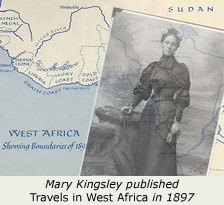Personal Accounts
Personal accounts are excellent sources for women’s history. These include travel accounts, diaries, memoirs, letters, and oral histories. These are more common in the last two centuries with the expansion of female literacy—throughout history most women (and men) were illiterate. While documents created for personal reasons often tell us about individual women, some of the attitudes they reflect and the experiences they discuss can be generalized.

Travel accounts tell the reader about the author as well as about his or her objects of observation. Among well-known examples of travel accounts are those of 19th-century middle-class and upper middle-class British women. Many of these record life—their own and those of the indigenous people—in areas colonized by Britain, such as Africa and India. They also reflect colonial and gendered assumptions about indigenous people.
Diaries and memoirs, kept by women of all ages, including young girls, tell the reader much about differing stages in the female life cycle, as well as about the development of women’s cultural, economic, and social lives. Although some of the most famous female diarists of the Renaissance came from the upper classes and many diary keepers of the late 18th and early 19th century were also upper class, producers of diaries hailed from a wide social spectrum. Memoirs differ from diaries because memoirs have been specifically written for a public audience. Because their producers are often public figures, more men than women have written memoirs.
Letters that women exchanged with friends and other family members also reveal the intricacies of female lives. When these personal documents record a historic event, they sometimes provide intensely personal interpretations of public occurrences. Wartime diaries and letters provide a home front perspective on war that may be radically different than that of the fighting front.
Finally, not all personal accounts take a written form. Oral tradition, including epics, lamentations, poems, and myths, are important sources for women’s history because women often participated in the production and maintenance of these forms of preliterate history.


